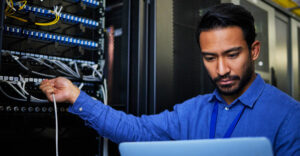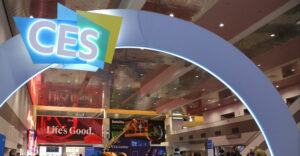
The 9th Annual Gilder/Forbes Telecosm (sic) Conference took place this week at Lake Tahoe. Officially, the theme was “the Singularity,” an artificial intelligence term denoting the emergence of transformative technological change. But the main meme revolved around a slightly less sexy idea: kiosks.
Kiosks and their close cousins, vending machines, tend to elicit images of laundromats and college dorms. But there’s a whole new wave of this distribution mechanism arriving at electronics shops, hospitals, and office buildings that should inform the nation’s political and economic debate.
Responding to Demand
Conference participant Bob French, president of mix&burn, discussed selling digital music through vending machines.
At first blush, the idea of selling digital music in the physical space might seem odd, but as French explained, locating his vending machine directly in shops like Best Buy, where someone can immediately load songs onto their just-purchased MP3 player, is turning out to be quite lucrative.
One reason for the idea’s success is the immediacy factor. Another is that it’s a way for those without broadband access to easily obtain digital music, eradicating the “digital divide” for music downloads. Mix&burn’s example shows that when there’s a true market demand for a service, as opposed to theoretical demands concocted by professional “digital divide” lobbyists, the market will respond.
Another new vending idea came from Ken Rosenblum, CEO of InstyMeds, a company that uses vending machines to label and dispense prescription medication directly to patients. Rosenblum came up with the idea one night when he was walking around looking for an open drug store. “Because of the shortage of pharmacists, a chain like CVS has less than 10 percent of its stores open 24 hours/day,” he said. That’s a huge problem for anyone who needs to get medication quickly at odd hours.
Benefits to Automation
With InstyMeds’ network of vending machines, a pharmacist sitting in a CVS call center could oversee automated dispensers in hundreds of their stores, thus allowing the stores to be open 24/7. Not only would that be convenient for customers, it would also boost productivity.
This point was made clearly in a keynote address by Steve Forbes.
He discussed the restaurant chain McDonalds, which has started to replace humans with kiosks in the ordering process. While some initially might be opposed to the idea of machines taking the place of humans, Forbes points out that the machines actually increase sales, and hence, employment.
When McDonalds implemented the kiosks, customers started to buy more food per average order, thereby increasing the need for more kitchen staff. “There’s no human censorship at kiosks,” said Forbes, making it more comfortable for people to order those four milkshakes without feeling social pressure. The kiosks are also faster, thereby boosting productivity.
McDonalds customers and employees aren’t the only ones benefiting from the automation and centralization of previously human-only functions — the technology can also help with national security.
Security, Efficiency
Wyse Technology, a company that makes kiosks without hard drives known as “thin clients,” has helped a number of firms and government agencies deal with security and efficiency problems due to scattered and dated PCs. Back in 2002, the FBI lost 317 laptops, creating a serious security problem.
Wyse CEO John Kish wouldn’t explicitly say that the FBI purchased his terminals, but he did confirm that a number of federal government agents are using them. If they are, that’s a step in the right direction because unlike PCs, thin clients have no value if they are lost and taken off the central system.
Probably the most successful example of kiosk technology implementation was Automated Teller Machines (ATM) by the financial services industry. But not everyone embraced ATMs immediately. When the machines first arrived on the scene there were those who opposed them for job-protectionist reasons. But as Steve Forbes discussed in his speech, the machines helped to significantly boost jobs in the long term. “Banks are now offering more services,” he said, “Productivity is a job creator.”
The lesson that participants can take away from this year’s Telecosm conference is that when technology is implemented by entrepreneurs to boost productivity, everyone wins. When it comes to technology like kiosks, it’s foolish to rage against the machine.
Sonia Arrison, a TechNewsWorld columnist, is director of Technology Studies at the California-based Pacific Research Institute. She also serves on the Technology Advisory Board for the Acceleration Studies Foundation.






















































As an individual who has worked numerous years in the kiosk industry, going back to 1999 I have seen a 10 fold of interest for kiosks and self service growth. Its a very emerging market sector for IT technology and the consumer world. We offer flexible solutions, we recently as example have seen the rise and popularity of our T5-D DVD Movie Box kiosk and how the consumer is grown in numbers using these devices to purchase the nights entertainment. KT Technology see http://www.kioskterminals.eu designed and manufactured a kiosk device which was so simple that even the non techie of us could use its simple step by step instruction, and with sales already increased twice fold in the past quarter we can see that consumers are keen to interact with technology, for a host of reasons.